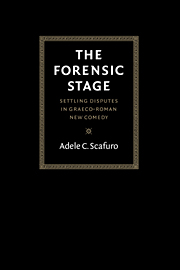Book contents
- Frontmatter
- Contents
- Preface
- Author's note on terminology, transliteration, translation, and texts
- List of abbreviations
- Introduction
- PART I PRE-TRIAL PLAYS
- 1 The staging of dispute settlement
- 2 Initiating justice: threat, summons, and arrest
- PART II RECONCILIATION AND ITS RHETORIC
- PART III PLAYING ON THE BOUNDARIES OF THE LAW
- APPENDICES
- Works cited
- General index
- Index locorum
1 - The staging of dispute settlement
Published online by Cambridge University Press: 03 March 2010
- Frontmatter
- Contents
- Preface
- Author's note on terminology, transliteration, translation, and texts
- List of abbreviations
- Introduction
- PART I PRE-TRIAL PLAYS
- 1 The staging of dispute settlement
- 2 Initiating justice: threat, summons, and arrest
- PART II RECONCILIATION AND ITS RHETORIC
- PART III PLAYING ON THE BOUNDARIES OF THE LAW
- APPENDICES
- Works cited
- General index
- Index locorum
Summary
Many characters of New Comedy exhibit what may be called a “forensic disposition.” Manifesting itself in the ease with which they call upon the law – for debate, for intimidating others, for assistance in their difficulties – it aligns them with many of the litigants who surface vividly in the speeches of fourth-century Attic orators: disparagers of philopragmones (busybodies), but philodikoi (lawsuit lovers) nonetheless. This disposition – in short, a flair for calling upon the law at the drop of a hat – appears in more and less overt ways throughout New Comedy.
More overtly, it reveals itself as characters easily discuss and debate the intricacies of such laws as those pertaining to epikleroi (heiresses without fathers or brothers), as they seek the advice of legal experts for drawing up documents or for promoting their understanding of the law, as they act as arbitrators of their neighbors' disputes, call on witnesses to testify to contractual agreements or wrongful acts, offer to torture slaves for evidence and sometimes march the tortured victims across the stage. They threaten suits against their adversaries, frame their friends and enemies to gain their ends, complain of the litigious conduct of others, and sometimes fear their own conduct will be seen in that same unflattering light. The texts of fourth-century Attic orators could easily have supplied material for any number of these situations and characters: e.g., the backroom manipulations over the estate of an epikleros in Isaios 10 ArisL; the ever victimized Mantitheos of [Dem.] 40 Boiot.
- Type
- Chapter
- Information
- The Forensic StageSettling Disputes in Graeco-Roman New Comedy, pp. 25 - 67Publisher: Cambridge University PressPrint publication year: 1997



